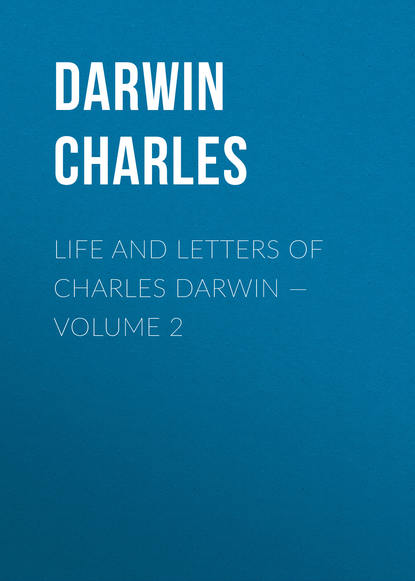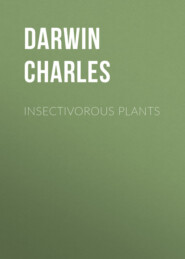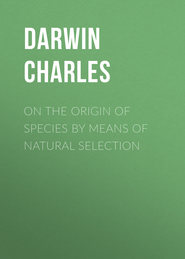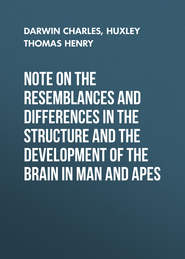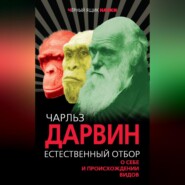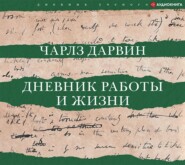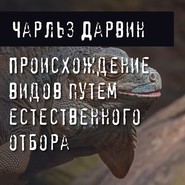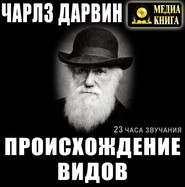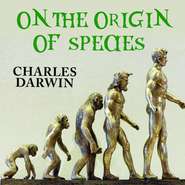По всем вопросам обращайтесь на: info@litportal.ru
(©) 2003-2025.
✖
Life and Letters of Charles Darwin — Volume 2
Настройки чтения
Размер шрифта
Высота строк
Поля
CHARLES DARWIN TO C. LYELL. Saturday [December 5th, 1859].
... I have had a letter from Carpenter this morning. He reviews me in the 'National.' He is a convert, but does not go quite so far as I, but quite far enough, for he admits that all birds are from one progenitor, and probably all fishes and reptiles from another parent. But the last mouthful chokes him. He can hardly admit all vertebrates from one parent. He will surely come to this from Homology and Embryology. I look at it as grand having brought round a great physiologist, for great I think he certainly is in that line. How curious I shall be to know what line Owen will take; dead against us, I fear; but he wrote me a most liberal note on the reception of my book, and said he was quite prepared to consider fairly and without prejudice my line of argument.
J.D. HOOKER TO CHARLES DARWIN. Kew, Monday.
Dear Darwin,
You have, I know, been drenched with letters since the publication of your book, and I have hence forborne to add my mite. I hope now that you are well through Edition II., and I have heard that you were flourishing in London. I have not yet got half-through the book, not from want of will, but of time — for it is the very hardest book to read, to full profits, that I ever tried — it is so cram-full of matter and reasoning. I am all the more glad that you have published in this form, for the three volumes, unprefaced by this, would have choked any Naturalist of the nineteenth century, and certainly have softened my brain in the operation of assimilating their contents. I am perfectly tired of marvelling at the wonderful amount of facts you have brought to bear, and your skill in marshalling them and throwing them on the enemy; it is also extremely clear as far as I have gone, but very hard to fully appreciate. Somehow it reads very different from the MS., and I often fancy I must have been very stupid not to have more fully followed it in MS. Lyell told me of his criticisms. I did not appreciate them all, and there are many little matters I hope one day to talk over with you. I saw a highly flattering notice in the 'English Churchman,' short and not at all entering into discussion, but praising you and your book, and talking patronizingly of the doctrine!.. Bentham and Henslow will still shake their heads I fancy...
Ever yours affectionately, JOS. D. HOOKER.
CHARLES DARWIN TO C. LYELL. Down, Saturday [December 12th, 1859].
... I had very long interviews with — , which perhaps you would like to hear about... I infer from several expressions that, at bottom, he goes an immense way with us...
He said to the effect that my explanation was the best ever published of the manner of formation of species. I said I was very glad to hear it. He took me up short: "You must not at all suppose that I agree with you in all respects." I said I thought it no more likely that I should be right in nearly all points, than that I should toss up a penny and get heads twenty times running. I asked him what he thought the weakest part. He said he had no particular objection to any part. He added: —
"If I must criticise, I should say, 'we do not want to know what Darwin believes and is convinced of, but what he can prove.'" I agreed most fully and truly that I have probably greatly sinned in this line, and defended my general line of argument of inventing a theory and seeing how many classes of facts the theory would explain. I added that I would endeavour to modify the "believes" and "convinceds." He took me up short: "You will then spoil your book, the charm of (!) it is that it is Darwin himself." He added another objection, that the book was too teres atque rotundus — that it explained everything, and that it was improbable in the highest degree that I should succeed in this. I quite agree with this rather queer objection, and it comes to this that my book must be very bad or very good...
I have heard, by roundabout channel, that Herschel says my book "is the law of higgledy-piggledy." What this exactly means I do not know, but it is evidently very contemptuous. If true this is a great blow and discouragement.
CHARLES DARWIN TO JOHN LUBBOCK. December 14th [1859].
... The latter part of my stay at Ilkley did me much good, but I suppose I never shall be strong, for the work I have had since I came back has knocked me up a little more than once. I have been busy in getting a reprint (with a very few corrections) through the press.
My book has been as yet VERY MUCH more successful than I ever dreamed of: Murray is now printing 3000 copies. Have you finished it? If so, pray tell me whether you are with me on the GENERAL issue, or against me. If you are against me, I know well how honourable, fair, and candid an opponent I shall have, and which is a good deal more than I can say of all my opponents...
Pray tell me what you have been doing. Have you had time for any Natural History?..
P.S. — I have got — I wish and hope I might say that WE have got — a fair number of excellent men on our side of the question on the mutability of species.
CHARLES DARWIN TO J.D. HOOKER. Down, December 14th [1859].
My dear Hooker,
Your approval of my book, for many reasons, gives me intense satisfaction; but I must make some allowance for your kindness and sympathy. Any one with ordinary faculties, if he had PATIENCE enough and plenty of time, could have written my book. You do not know how I admire your and Lyell's generous and unselfish sympathy, I do not believe either of you would have cared so much about your own work. My book, as yet, has been far more successful than I ever even formerly ventured in the wildest day-dreams to anticipate. We shall soon be a good body of working men, and shall have, I am convinced, all young and rising naturalists on our side. I shall be intensely interested to hear whether my book produces any effect on A. Gray; from what I heard at Lyell's, I fancy your correspondence has brought him some way already. I fear that there is no chance of Bentham being staggered. Will he read my book? Has he a copy? I would send him one of the reprints if he has not. Old J.E. Gray (John Edward Gray (1800-1875), was the son of S.F. Gray, author of the 'Supplement to the Pharmacopoeia.' In 1821 he published in his father's name 'The Natural Arrangement of British Plants,' one of the earliest works in English on the natural method. In 1824 he became connected with the Natural History Department of the British Museum, and was appointed Keeper of the Zoological collections in 1840. He was the author of 'Illustrations of Indian Zoology,' 'The Knowsley Menagerie,' etc., and of innumerable descriptive Zoological papers.), at the British Museum, attacked me in fine style: "You have just reproduced Lamarck's doctrine and nothing else, and here Lyell and others have been attacking him for twenty years, and because YOU (with a sneer and laugh) say the very same thing, they are all coming round; it is the most ridiculous inconsistency, etc., etc."
You must be very glad to be settled in your house, and I hope all the improvements satisfy you. As far as my experience goes, improvements are never perfection. I am very sorry to hear that you are still so very busy, and have so much work. And now for the main purport of my note, which is to ask and beg you and Mrs. Hooker (whom it is really an age since I have seen), and all your children, if you like, to come and spend a week here. It would be a great pleasure to me and to my wife... As far as we can see, we shall be at home all the winter; and all times probably would be equally convenient; but if you can, do not put it off very late, as it may slip through. Think of this and persuade Mrs. Hooker, and be a good man and come.
Farewell, my kind and dear friend, Yours affectionately, C. DARWIN.
P.S. — I shall be very curious to hear what you think of my discussion on Classification in Chapter XIII.; I believe Huxley demurs to the whole, and says he has nailed his colours to the mast, and I would sooner die than give up; so that we are in as fine a frame of mind to discuss the point as any two religionists.
Embryology is my pet bit in my book, and, confound my friends, not one has noticed this to me.
CHARLES DARWIN TO ASA GRAY. Down, December 21st [1859].
My dear Gray,
I have just received your most kind, long, and valuable letter. I will write again in a few days, for I am at present unwell and much pressed with business: to-day's note is merely personal. I should, for several reasons, be very glad of an American Edition. I have made up my mind to be well abused; but I think it of importance that my notions should be read by intelligent men, accustomed to scientific argument, though NOT naturalists. It may seem absurd, but I think such men will drag after them those naturalists who have too firmly fixed in their heads that a species is an entity. The first edition of 1250 copies was sold on the first day, and now my publisher is printing off, as RAPIDLY AS POSSIBLE, 3000 more copies. I mention this solely because it renders probable a remunerative sale in America. I should be infinitely obliged if you could aid an American reprint; and could make, for my sake and the publisher's, any arrangement for any profit. The new edition is only a reprint, yet I have made a FEW important corrections. I will have the clean sheets sent over in a few days of as many sheets as are printed off, and the remainder afterwards, and you can do anything you like, — if nothing, there is no harm done. I should be glad for the new edition to be reprinted and not the old. — In great haste, and with hearty thanks,
Yours very sincerely, C. DARWIN.
I will write soon again.
CHARLES DARWIN TO C. LYELL. Down, 22nd [December, 1859].
My dear Lyell, Thanks about "Bears" (See 'Origin,' edition i., page 184.), a word of il-omen to me.
I am too unwell to leave home, so shall not see you.
I am very glad of your remarks on Hooker. (Sir C. Lyell wrote to Sir J.D. Hooker, December 19, 1859 ('Life,' ii. page 327): "I have just finished the reading of your splendid Essay [the 'Flora of Australia'] on the origin of species, as illustrated by your wide botanical experience, and think it goes very far to raise the variety-making hypothesis to the rank of a theory, as accounting for the manner in which new species enter the world.") I have not yet got the essay. The parts which I read in sheets seemed to me grand, especially the generalization about the Australian flora itself. How superior to Robert Brown's celebrated essay! I have not seen Naudin's paper ('Revue Horticole,' 1852. See historical Sketch in the later editions of the 'Origin of Species.'), and shall not be able till I hunt the libraries. I am very anxious to see it. Decaisne seems to think he gives my whole theory. I do not know when I shall have time and strength to grapple with Hooker...
P.S. — I have heard from Sir W. Jardine (Jardine, Sir William, Bart., 1800-1874), was the son of Sir A. Jardine of Applegarth, Dumfriesshire. He was educated at Edinburgh, and succeeded to the title on his father's decease in 1821. He published, jointly with Mr. Prideaux, J. Selby, Sir Stamford Raffles, Dr. Horsfield, and other ornithologists, 'Illustrations of Ornithology,' and edited the 'Naturalist's Library,' in 40 volumes, which included the four branches: Mammalia, Ornithology, Ichnology, and Entomology. Of these 40 volumes 14 were written by himself. In 1836 he became editor of the 'Magazine of Zoology and Botany,' which, two years later, was transformed into 'Annals of Natural History,' but remained under his direction. For Bohn's Standard Library he edited White's 'Natural History of Selborne.' Sir W. Jardine was also joint editor of the 'Edinburgh Philosophical Journal,' and was author of 'British Salmonidae,' 'Ichthyology of Annandale,' 'Memoirs of the late Hugh Strickland,' 'Contributions to Ornithology,' 'Ornithological Synonyms,' etc. — (Taken from Ward, 'Men of the Reign,' and Cates, 'Dictionary of General Biography.'): his criticisms are quite unimportant; some of the Galapagos so-called species ought to be called varieties, which I fully expected; some of the sub-genera, thought to be wholly endemic, have been found on the Continent (not that he gives his authority), but I do not make out that the species are the same. His letter is brief and vague, but he says he will write again.
CHARLES DARWIN TO J.D. HOOKER. Down [23rd December, 1859].
My dear Hooker,
I received last night your 'Introduction,' for which very many thanks; I am surprised to see how big it is: I shall not be able to read it very soon. It was very good of you to send Naudin, for I was very curious to see it. I am surprised that Decaisne should say it was the same as mine. Naudin gives artificial selection, as well as a score of English writers, and when he says species were formed in the same manner, I thought the paper would certainly prove exactly the same as mine. But I cannot find one word like the struggle for existence and natural selection. On the contrary, he brings in his principle (page 103) of finality (which I do not understand), which, he says, with some authors is fatality, with others providence, and which adapts the forms of every being, and harmonises them all throughout nature.
He assumes like old geologists (who assumed that the forces of nature were formerly greater), that species were at first more plastic. His simile of tree and classification is like mine (and others), but he cannot, I think, have reflected much on the subject, otherwise he would see that genealogy by itself does not give classification; I declare I cannot see a MUCH closer approach to Wallace and me in Naudin than in Lamarck — we all agree in modification and descent. If I do not hear from you I will return the 'Revue' in a few days (with the cover). I dare say Lyell would be glad to see it. By the way, I will retain the volume till I hear whether I shall or not send it to Lyell. I should rather like Lyell to see this note, though it is foolish work sticking up for independence or priority.
Ever yours, C. DARWIN.
A. SEDGWICK (Rev. Adam Sedgwick, 1785-1873, Woodwardian Professor of Geology in the University of Cambridge.) TO CHARLES DARWIN. Cambridge, December 24th, [1859].
My dear Darwin,
I write to thank you for your work on the 'Origin of Species.' It came, I think, in the latter part of last week; but it MAY have come a few days sooner, and been overlooked among my book-parcels, which often remain unopened when I am lazy or busy with any work before me. So soon as I opened it I began to read it, and I finished it, after many interruptions, on Tuesday. Yesterday I was employed — 1st, in preparing for my lecture; 2ndly, in attending a meeting of my brother Fellows to discuss the final propositions of the Parliamentary Commissioners; 3rdly, in lecturing; 4thly, in hearing the conclusion of the discussion and the College reply, whereby, in conformity with my own wishes, we accepted the scheme of the Commissioners; 5thly, in dining with an old friend at Clare College; 6thly, in adjourning to the weekly meeting of the Ray Club, from which I returned at 10 P.M., dog-tired, and hardly able to climb my staircase. Lastly, in looking through the "Times" to see what was going on in the busy world.
I do not state this to fill space (though I believe that Nature does abhor a vacuum), but to prove that my reply and my thanks are sent to you by the earliest leisure I have, though that is but a very contracted opportunity. If I did not think you a good-tempered and truth-loving man, I should not tell you that (spite of the great knowledge, store of facts, capital views of the correlation of the various parts of organic nature, admirable hints about the diffusion, through wide regions of many related organic beings, etc., etc.) I have read your book with more pain than pleasure. Parts of it I admired greatly, parts I laughed at till my sides were almost sore; other parts I read with absolute sorrow, because I think them utterly false and grievously mischievous. You have DESERTED — after a start in that tra-road of all solid physical truth — the true method of induction, and started us in machinery as wild, I think, as Bishop Wilkins's locomotive that was to sail with us to the moon. Many of your wide conclusions are based upon assumptions which can neither be proved nor disproved, why then express them in the language and arrangement of philosophical induction? As to your grand principle — NATURAL SELECTION — what is it but a secondary consequence of supposed, or known, primary facts! Development is a better word, because more close to the cause of the fact? For you do not deny causation. I call (in the abstract) causation the will of God; and I can prove that He acts for the good of His creatures. He also acts by laws which we can study and comprehend. Acting by law, and under what is called final causes, comprehends, I think, your whole principle. You write of "natural selection" as if it were done curiously by the selecting agent. 'Tis but a consequence of the presupposed development, and the subsequent battle for life. This view of nature you have stated admirably, though admitted by all naturalists and denied by no one of common sense. We all admit development as a fact of history: but how came it about? Here, in language, and still more in logic, we are point-blank at issue. There is a moral or metaphysical part of nature as well a physical. A man who denies this is deep in the mire of folly. 'Tis the crown and glory of organic science that it DOES through FINAL CAUSE, link material and moral; and yet DOES NOT allow us to mingle them in our first conception of laws, and our classification of such laws, whether we consider one side of nature or the other. You have ignored this link; and, if I do not mistake your meaning, you have done your best in one or two pregnant cases to break it. Were it possible (which, thank God, it is not) to break it, humanity, in my mind, would suffer a damage that might brutalize it, and sink the human race into a lower grade of degradation than any into which it has fallen since its written records tell us of its history. Take the case of the bee-cells. If your development produced the successive modification of the bee and its cells (which no mortal can prove), final cause would stand good as the directing cause under which the successive generations acted and gradually improved. Passages in your book, like that to which I have alluded (and there are others almost as bad), greatly shocked my moral taste. I think, in speculating on organic descent, you OVER-state the evidence of geology; and that you UNDER-state it while you are talking of the broken links of your natural pedigree: but my paper is nearly done, and I must go to my lecture-room. Lastly, then, I greatly dislike the concluding chapter — not as a summary, for in that light it appears good — but I dislike it from the tone of triumphant confidence in which you appeal to the rising generation (in a tone I condemned in the author of the 'Vestiges') and prophesy of things not yet in the womb of time, nor (if we are to trust the accumulated experience of human sense and the inferences of its logic) ever likely to be found anywhere but in the fertile womb of man's imagination. And now to say a word about a son of a monkey and an old friend of yours: I am better, far better, than I was last year. I have been lecturing three days a week (formerly I gave six a week) without much fatigue, but I find by the loss of activity and memory, and of all productive powers, that my bodily frame is sinking slowly towards the earth. But I have visions of the future. They are as much a part of myself as my stomach and my heart, and these visions are to have their antitype in solid fruition of what is best and greatest. But on one condition only — that I humbly accept God's revelation of Himself both in his works and in His word, and do my best to act in conformity with that knowledge which He only can give me, and He only can sustain me in doing. If you and I do all this we shall meet in heaven.
I have written in a hurry, and in a spirit of brotherly love, therefore forgive any sentence you happen to dislike; and believe me, spite of any disagreement in some points of the deepest moral interest, your tru-hearted old friend,
A. SEDGWICK.
CHARLES DARWIN TO T.H. HUXLEY. Down, December 25th [1859].
My dear Huxley,
One part of your note has pleased me so much that I must thank you for it. Not only Sir H.H. [Holland], but several others, have attacked me about analogy leading to belief in one primordial CREATED form. ('Origin,' edition i. page 484. — "Therefore I should infer from analogy that probably all the organic beings which have ever lived on this earth have descended from some one primordial form, into which life was first breathed.") (By which I mean only that we know nothing as yet [of] how life originates.) I thought I was universally condemned on this head. But I answered that though perhaps it would have been more prudent not to have put it in, I would not strike it out, as it seemed to me probable, and I give it on no other grounds. You will see in your mind the kind of arguments which made me think it probable, and no one fact had so great an effect on me as your most curious remarks on the apparent homologies of the head of Vertebrata and Articulata.
You have done a real good turn in the Agency business ("My General Agent" was a sobriquet applied at this time by my father to Mr. Huxley.) (I never before heard of a hard-working, unpaid agent besides yourself), in talking with Sir H.H., for he will have great influence over many. He floored me from my ignorance about the bones of the ear, and I made a mental note to ask you what the facts were.
With hearty thanks and real admiration for your generous zeal for the subject.
Yours most truly, C. DARWIN.





